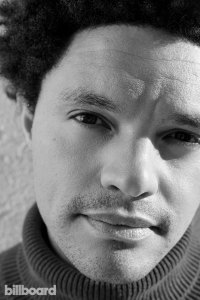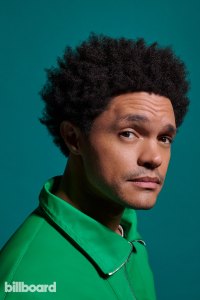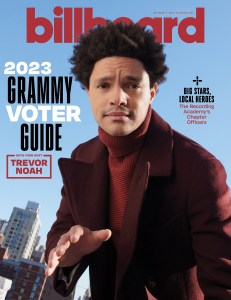

Trevor Noah Returns as Grammys Host and ‘Anything Can Happen’
Life after 'The Daily Show' means a world tour — and his third consecutive time hosting the Grammys, Billboard exclusively announces, a 'cheat code' for a die-hard music lover like himself.
When asked to describe how he felt hosting the 63rd annual Grammy Awards in March 2021, Trevor Noah has trouble choosing just one word — but he lands on “intrigued.”
It was his first time hosting, and a year of other big firsts, too: Ben Winston’s first year executive-producing the broadcast and the first time in the Grammys’ six-decade history that a pandemic had upended the show. At the Los Angeles Convention Center, guests of honor were masked and seated at socially distanced tables of two. Shrubbery and patio lights added warmth to the usually sterile space, as the limited in-person audience — almost exclusively nominees — offered much-quieter-than-usual applause for the global superstars who took home awards, like Megan Thee Stallion, Beyoncé, Taylor Swift and Billie Eilish.
Yet the night’s limitations also yielded other exciting firsts, like watching Harry Styles cheer and whistle for Eilish during her performance of “Everything I Wanted” and seeing Bad Bunny gyrate along to Dua Lipa’s “Levitating.” “Nobody knew what was happening, and yet everybody was trying to create a semblance of normalcy,” Noah recalls. “It felt cavernous. There’s no crowd. You would think it would be awkward — but it became less awkward. It became intimate.”
Trending on Billboard
This year will be Noah’s third consecutive time hosting, and he says that experience, too, has made the monumental awards show feel closer to normal — so much so that he has updated his one-word descriptor of the gig from “intrigued” to “celebratory.”
For Noah, 38, scoring one of the most coveted hosting gigs on TV was more than a career move. The voracious music consumer realized that hosting unlocked the ultimate hack: gaining access to music he loves that no VIP pass could rival. Noah jumps at the opportunity to gush over his favorite performances: “The greatest concert that I’ve been to in my life is easily Beyoncé!” he exclaims, recalling “Beychella” before rattling off other favorites, like Daniel Caesar at Coachella, Black Coffee in Brooklyn and Kendrick Lamar during his The Big Steppers Tour (“truly out-of-this-world special”). In the end, he changes his mind about his “greatest” concert ever, handing the crown to jazz savant Robert Glasper.
But the longtime Daily Show host and comic boasts plenty of other qualifications beyond his inspired fandom that make him the ideal host for music’s biggest night. “He makes you feel like his friend who’s not talking to an arena, but just talking to you on your couch,” Winston says. “That’s what makes him so brilliant.”
Winston’s assumption of the Grammys’ production reins coincided with an unprecedented dip in viewership — 18.7 million viewers in 2020 plummeted to 8.8 million in 2021, according to Nielsen. But despite the show’s struggles with ratings, his leadership and Noah’s hosting have modernized the telecast and led to an unusually positive reception from fans. “We’ve put so much effort and energy into making sure that this is real representation of all sides of music,” Winston says.
When Billboard connects with Noah in late November, he hasn’t yet started preparing for the broadcast on Feb. 5, 2023. Instead, he’s thinking about his final episodes of The Daily Show, which he’ll leave on Dec. 8 after announcing his planned departure in September. “I’m focused on the now, on the episode I’m doing today, and I know there’ll be a little break on the other side,” he says. “From there, there are tons of things I’ve always wanted to do.”
In January, Noah will embark on his Off the Record world tour with shows planned in 28 U.S. cities, as well as stops in Europe and his native South Africa. He has left extra time between stops to explore the cultures of local communities and especially hopes to spend time “celebrating life” alongside family in South Africa, where his awards show-hosting journey began 13 years ago at the South Africa Film and Television Awards. He has added quite a few notches to his hosting belt since then, but relishes his ongoing role at the Grammys all the same.
“In a world where everything is becoming increasingly niche,” he says, “there are few collective experiences that we can share where everyone gets something they want.” And Noah knows firsthand that even if an artist doesn’t take home an award, a night at the Grammys is a win in its own right.

In the last 30 years, the only other person to host the Grammys at least three consecutive times was LL Cool J. How does it feel to be in that company?
I don’t think it’s normal to host it once, so I don’t have a great frame of reference for this. It is thrilling. For me, it’s a cheat code because I’m a fan of almost all the people who are there. It has also been interesting because of the journey. The first one was [during] COVID-19, and it was a completely different way to make the show. And then the next one was in Las Vegas because of the restrictions [in Los Angeles], and that was a different type of show. Now it’s exciting [because] it’ll be the first one for me back in L.A. — that’s hopefully not just normal, but different for the right reasons.
Were you hesitant to say yes the first time because of pandemic restrictions?
Yes and no. Yes, because you’re wondering what and how it will be, but no, because I love working with Ben Winston. The entire team makes it easy to have as few inhibitions as possible about hosting. I don’t ever want to do something reflexively and then have it be half-hearted. I always think, “That sounds like something I’d want to do, but let me think about it. What would I bring to it? What can I add?” It’s an obvious yes, but I always take a moment regardless. I was doing [The Daily Show] during COVID-19. I was like, “Well, you can make a show from your apartment. Surely we can figure out how to make it in a parking lot and this giant warehouse.”
What do you think it takes to host the Grammys?
I’ve been lucky enough to work in television — when I count South Africa as well — for 18 years. I’ve been lucky enough to host crazy productions where everyone’s running around and you have to hit your marks and do different things. And most importantly — funny enough — is that I don’t take myself too seriously. I allow myself [to be] comfortable with the idea that everything could go wrong in a moment.
What happens that we don’t know about behind the scenes on Grammy night?
Sometimes [producers] don’t know where the artist is, or someone went to the bathroom at the wrong time. It’s just the craziest, unluckiest thing that will happen to you, and 99 times out of 100, it doesn’t happen. But when it does, everybody needs to breathe and keep everything aimed in the right direction. We always plan for the worst and hope for the best.
What do you think about this year’s nominees — any standout snubs or surprises?
It’s funny, I remember one day a friend of mine asked me — as if I chose [the nominees] — “Why didn’t these people get nominated?” I was like, “Hey, I get it.” There’s always somebody that we’re going to feel is missing. I’m lucky because I’m not responsible for voting. I’m not in charge of anything. I just get to be the person who keeps the show moving.
Do you have any creative input in terms of the show itself?
I do, which is really fun. I’m really lucky that Ben Winston creates an environment where you don’t work for him, you work with him. That’s what makes it so much fun. We’re always thinking of new ideas, coming up with different moments — him proposing the genesis of the idea and then me figuring out how to take it somewhere else or [vice versa]. I am lucky that there are some moments where I go, “This was a seed that germinated in my head, and we grew it into something that ended up being on the show.”
What’s an idea that you had for the show that sticks out?
The conversation with Silk Sonic. [At the 2021 Grammys, Noah sat between Bruno Mars and Anderson .Paak, chatting with .Paak and ignoring Mars in a riff on Encanto’s chart-topping “We Don’t Talk About Bruno.”] Planning that out, those beats and that comedy, that was really cool. I was hoping it would work, and it did. It’s nice because artists are often viewed only through the lens of the music they create, which can sometimes be one-dimensional. It’s fun to get something from them that you don’t usually [get]. People love BTS, but it was cool to play with them as human beings, to have fun with who they are, show off their charisma and their flair. The same goes for Silk Sonic [and] all of these artists whom so many people enjoy, but don’t realize are also human beings who have really fun and interesting opinions and vibes.

Do you watch the acts rehearse?
I’ve seen every single one of them that has performed. What many people don’t realize is how much work goes into the performances. Getting every single key right, every lighting cue perfect, choreographing all the moves between the cameras and the artists. Seeing the artists and how much they love what they’re doing — they’ll put so much time into that three- or four-minute performance. You don’t truly appreciate it until you get behind the scenes, and I think that’s what makes me enjoy the show even more. That’s why I put the effort that I do into it. I go, “Wow, they’re going to put in this much work, I have no excuse to not give 110%.”
You’re a great fit for the role — you have such fanboy energy.
I am 1,000% a fan, and what I love about the Grammys is that I become a fan of a new artist every single time. I come in and then I meet this new artist, and all of a sudden, here I am going, “Who are the Black Pumas?” It introduces you to music that you maybe wouldn’t have been [exposed to].
Who are some of the other artists whom the Grammys have made you a fan of?
I already came in as a fan of Cardi B and Megan Thee Stallion, but I became a bigger fan because I saw the work that they put into the performance. Brandi Carlile was my favorite live performance at last year’s Grammys. She was stellar. She had a command of not just the stage, but every single note that she was performing in a way that few artists can achieve consistently.
You talk a lot about how artists prepare for the show. How do you prepare to host?
First of all, I listen to absolutely everything that’s going to be on the show, just to get a sense of the vibe. I want to get into the feeling of what’s going to be happening on the night. I spend a lot of time writing and preparing for what will or won’t happen. I try to think about what’s happening in music and pop culture. Then obviously I’m paying attention to what’s happening on the night. I try to craft my performance so that it is most complementary for what is happening from one performance to the next. We rehearse a lot, and we need to because it’s live and, as I said, anything can happen.
Do you use a script or a teleprompter, or do you like to go off the cuff?
Anyone who works with me knows I’m always going to go off the cuff. But we have the script so that we know where we’re going. I think that’s what makes live [TV] great. If something happens that wasn’t in the script and you want to comment or make a joke about it, we do, and it’s fun. The show is experiencing itself live; we don’t know what anyone will say when they accept an award. We don’t know what anybody might do before or after their performance, so what’s great is to be able to respond to that. I don’t ever want the show to feel like every single element of it is completely scripted, because it isn’t. But at the same time, it’s all planned.
Is there anything that’s off limits? Anything that makes you say, “Yeah, I’m not going to touch that”?
I’ll go wherever the jokes take me. But I’m always aware that I am there in service of the show. This is not my show, nor do I try to pretend that it is. A good host is somebody who keeps the show moving in the right direction, makes sure that they bring the audience into what’s happening, engages and entertains everybody who’s in the room and really turns it into a party. Everyone is there to have a good time. It’s an awards show, but it’s also one of the greatest concerts you’ll ever get the opportunity to go to. There’s nothing that I’m like, “I can’t say that.” It’s more, “Is this appropriate for the show that I’m trying to put on?” I’ll cover politics when I’m on The Daily Show and music when I’m [hosting] the Grammys. For me, the most important thing is that it’s a celebration.

Last year, you opened with a reference to Will Smith slapping Chris Rock at the Academy Awards, saying, “We’re going to be keeping people’s names out of our mouths.”
(Laughs.) Well, I mean, the Oscars had just happened, so what I wanted people to understand was that they didn’t need to have tension. All of a sudden, everyone had this idea that every awards show was going to be this [space] where anything could happen — in a bad way. I was like, “Hey, we’ll see what happens. We’re going to have a good time. We’re not planning for anything crazy to happen. So let’s go with it.”
You’re a comic and a journalist, among the many hats you wear. Is it ever difficult to strike a balance in a space like the Grammys?
I don’t think I’ve struggled to strike a balance because I exist in many different spaces as a person. Contrary to some people’s popular belief, I don’t spend 24 hours in my day talking about politics or the news. I spend a lot of time laughing, reading, listening to music, talking about music and discussing what’s happening in pop culture. So, if anything, it’s one of the more natural experiences for me. I love entertaining. I love watching live performances. And the Grammys bring it all together.
You were nominated for a Grammy in 2020. Does that hold as much value in comedy as in music?
I think it holds even more value because most comedians will never produce any music worth winning a Grammy. So the fact that we can win a Grammy is pretty amazing, if you ask me.
If you could use your influence to make a change at the Grammys, what would it be?
A lot of what I would suggest is what I’ve heard [Recording Academy CEO] Harvey [Mason Jr.] talk about: trying to create a Grammys where the music reflects the awards show and the awards show reflects the music. Oftentimes [with] awards shows, there may be a disconnect between the general public who are consuming music and the people who are voting on the music. It’s important for every awards show [that] wishes to maintain its relevance to understand that difference. The audience isn’t wrong in having different tastes or a preference on whom they wish to see. I think in music as a whole, you have to acknowledge that, and the Grammys has, albeit slowly.
Think of hip-hop finally being included way back in the day. It’s important for the awards to always consider what is making an impact in the world because there is no music that is better than another if people are enjoying it. There may be music that producers will enjoy more than the average person on the street, there may be music that travels the globe and does really well regardless of the language that it’s performed in.
An example of that this year is Bad Bunny having the first-ever all-Spanish album up for album of the year.
That’s what I would have suggested, and there it is already. It’s good to create that whilst also remembering and understanding how important it is to maintain awards for categories that won’t be considered popular or widespread but deserve the acclaim. Like an Esperanza Spalding, for instance. The general public may be like, “Wait, who is this?” But the music industry goes, “You have to acknowledge and reward this person and award them for what they’ve done.” Everything I would suggest, I see them doing. Many of us will be impatient and want things to happen a lot faster, but anything meaningful will be done with [enough] time and measure to make sure it’s done correctly.
One common complaint about the Grammys is related to the way the academy categorizes music.
That’s always going to be difficult. All the time I’ll hear artists going, “Wait, what do you mean I am soft rock or pop or rap? What’s the difference between this rap thing and that rap thing?” I would assume one of the best ways to deal with it is to talk to the musicians in these categories and get them to be the ones who define the categories themselves. Who understands the music better than the people who are actually making it?
Why do you continue coming back to host the Grammys?
I’m enjoying the fact that we’re juggling flaming swords. Just putting it all together, combining different genres, getting the musicians in sync with each other and the audience, keeping the audience in tune with what’s happening. One of my favorite things about the Grammys as a whole is it is one of the few places where you get to experience artists in their rawest element, which is performing their music live. Brandi Carlile performing a song live and you’re hearing her voice and listening to her play her instruments — there’s nothing like it. You develop a deep appreciation for what these people are doing beyond just the music that they make.

This story will appear in the Dec. 17, 2022, issue of Billboard.
